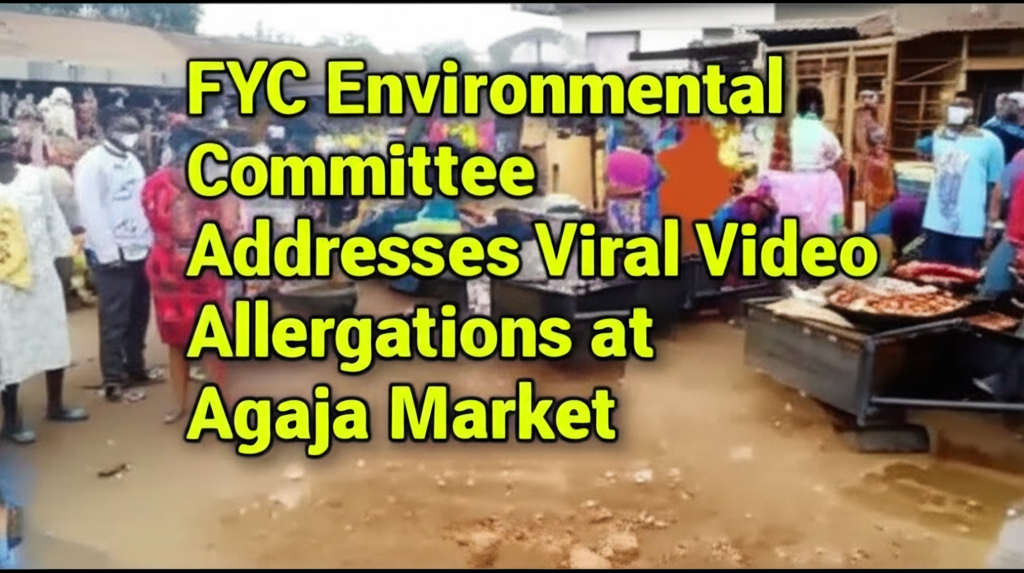FYC Environmental Committee Addresses Viral Video Allegations at Agaja Market
FYC Environmental Team Intervenes at Agaja Market Following Public Health Scare
FINIMA – The Finima Youth Council (FYC) Environmental Committee has launched an extensive monitoring and public health education programme at Agaja market after a viral online video sparked widespread public outrage. The video, which circulated on various social media platforms, alleged that a vegetable vendor was using water from a contaminated source to wash his produce, raising serious concerns about food safety and public health within Finima community and Bonny Kingdom.
In a swift and organised response, the FYC Director of Environment and a dedicated environmental team descended on the market on Monday, 11th August 2025. Their visit was aimed at conducting a thorough and impartial investigation into the claims and ensuring that the health of the community’s residents was not being compromised. The speed of the FYC’s intervention underscored the severity of the public’s reaction and the urgency with which community leaders needed to address the issue.
The initial allegation, fueled by the video, pointed to a specific pit as the source of the unsanitary water. However, the FYC’s on-site investigation, which included gathering information from multiple eyewitnesses and engaging directly with the market leadership, unearthed a different, yet equally disturbing, truth. According to the findings, the vendor in question had not, in fact, used the alleged pit. Instead, the team discovered a more systemic and widespread problem: numerous fruit and vegetable sellers were habitually using collected rainwater to prepare their goods for sale.
This practice, while seemingly benign to the vendors, was immediately flagged as a serious public health risk by the FYC team. “Using rainwater to wash foodstuffs is an unhealthy act that is highly condemnable,” stated a source close to the committee. The FYC explained that rainwater, particularly in an urban or semi-urban environment, can be a host for various contaminants. As it falls and collects, it can pick up pollutants from the atmosphere, dirt and grime from rooftops and guttering, as well as bacteria from unsanitary storage containers. The risk of waterborne diseases and other health complications for consumers is, therefore, significant.

The discovery prompted an immediate educational session with the vendors. The FYC team did not simply issue a warning but took the time to explain the dangers of their actions. They provided a detailed and practical lesson on the fundamental importance of using clean, potable water for all food preparation. They stressed that the health of the community was a shared responsibility and that the vendors, as frontline providers of essential foodstuffs, held a crucial role in safeguarding it. The session was intended to be both a stern caution and a constructive effort to reform their practices for the long term.

Following the initial intervention, the FYC Environmental Committee has announced a new, proactive enforcement programme. The committee will henceforth be conducting constant monitoring of vendors’ activities at the market to ensure they comply with standard health practices. This move is a clear signal that the council is not content with a one-off visit but is committed to creating a lasting change in market hygiene standards.
The incident has also highlighted a significant infrastructural deficiency within the market itself. The FYC’s findings point to a lack of a readily available, safe water supply as a root cause of the vendors’ unsanitary practices. In light of this, the FYC has issued a formal and urgent appeal to the Sole Administrator of Bonny Local Government Area (LGA) and other relevant stakeholders. They are calling for immediate intervention to provide a reliable source of clean, potable water within the market premises.


In an official statement, Omie D. Brown, the Public Relations Officer for the FYC Environmental Committee, reiterated the council’s core mission. “We are dedicated to safeguarding the health of residents of Finima community & Bonny Kingdom at large,” the statement read. The call to action is not just for government officials but for the entire community. It reinforces the message that “a healthy environment is a collective effort of every individual.” The FYC is urging all citizens to join hands in making Finima and Bonny Kingdom a safer and healthier place for all.

This episode serves as a powerful reminder of the intricate link between public health, community action, and government infrastructure. The swift response from the FYC, driven by a concerned citizenry, has not only addressed an immediate health scare but has also shone a light on the broader need for improved market facilities. As the FYC begins its sustained monitoring efforts, the community now looks to the local government to provide the essential infrastructure that will allow vendors to operate safely and ensure the continued well-being of all residents. The hope is that this incident will catalyse lasting change, leading to a more hygienic and secure food supply for Finima and Bonny Kingdom.
“A healthy environment is a collective responsibility,” said Omie D. Brown, Public Relations Officer of the FYC Environmental Committee. “We must work together to make Finima Community and Bonny Kingdom safe and healthy for all.”
The FYC reaffirmed its commitment to protecting the health and wellbeing of residents in Finima and the wider Bonny Kingdom.



You must be logged in to post a comment.